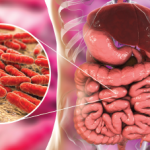Anti-MAP therapy requires strong antibiotics that include zythromax, clarithromycin (i.e., Biaxin) and refabutin, which also treat TB. Although MAP is in the TB-related family, it’s resistant to many TB drugs and therefore tougher to treat. “Biaxin and rifabutin, when given together, are usually effective in getting rid of MAP,” Dr. Naser says, adding that he does not see harm in adding antibiotics to a regimen for rheumatoid arthritis patients. “It’s a minimum of three months on the antibiotics,” he says. “When you read more about TB, you see patients are on this for a minimum of one year to clear the bacteria from their lungs. But with MAP, within three months patients are likely to see a difference in how they feel.”
According to Dr. Bég, the MAP/Crohn’s connection is strong, and there’s a website dedicated to creating a vaccine to protect against contracting MAP. Additionally, the antibiotic combination therapy RHB-104, developed by RedHill Biopharma, is an oral capsule with intracellular, antimycobacterial and anti-inflammatory properties that is currently in clinical trials to determine its effectiveness in eradicating MAP infection in patients with Crohn’s.
Although no commercial blood test is currently available to test humans for MAP, RedHill is developing one in collaboration with Quest Diagnostics. The UCF researchers analyzed blood serum and performed a polymerase chain reaction, which amplifies selected sections of DNA or RNA for analysis.
For the MAP/RA connection, however, more studies are needed. “We studied 100 patients and would like to expand our study to see if the numbers go up or down,” Dr. Naser says. As the first study to report anything like this with regard to RA, the researchers say their goal is to have this genetic mutation easily tested, as well as developing a way to prevent MAP with a vaccine and developing an effective antibacterial treatment for RA, in addition to immunosuppressant treatments.
Since the study has been published internationally, Dr. Bég says she is receiving emails from people asking if they can volunteer for studies. “Unfortunately, we’re not there yet to make it a multinational study, but our goal is maybe looking at different ethnicities and backgrounds to see if there’s a difference in MAP expression in people from different countries,” she says. “It’s all pretty exciting. Hopefully, we can keep doing the work we’re doing and find something here that will help our patients.”
Renée Bacher is a frequent contributor to ENT Today and the AARP Bulletin. Her article about heart disease in women, “This Story Could Save Your Life,” won a recent National Health Information Award for Family Circle magazine.
References
- Sharp RC, Bég SA, Naser SA. Polymorphisms in protein tyrosine phosphatase non-receptor type 2 and 22 (PTPN2/22) are linked to hyper-proliferative T-cells and susceptibility to Mycobacteria in rheumatoid arthritis. Front Cell Infect Microbiol. 2018 Jan 25;8:11. https://doi.org/10.3389/fcimb.2018.00011.
- Frie MC, Sporer KRB, Kirkpatrick BW, et al. T and B cell activation profiles from cows with and without Johne’s disease in response to in vitro stimulation with Mycobacterium avium subspecies paratuberculosis. Vet Immunol Immunopathol. 2017 Dec;193–194:50–56.
- Researcher finds possible link between cattle, human disease. WSU Insider. 2016 Nov 4.

